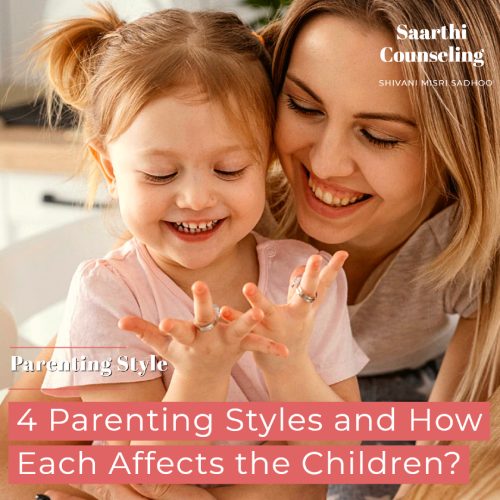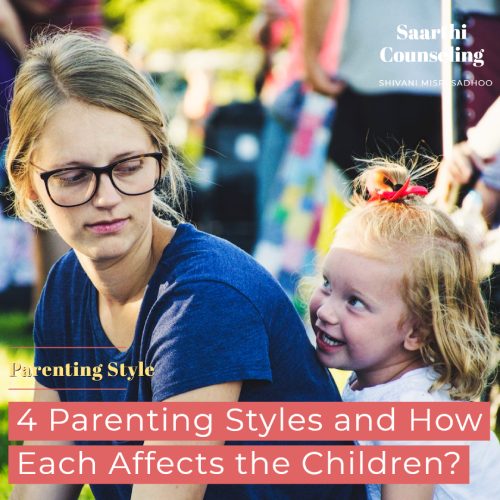Marriage and Family Therapist Shivani Sadhoo Shares How Our Emotional Awareness Dramatically Influences Your Success and Happiness in All Walks of Life, including Family Relationships.
The journey of parenting can be rewarding and fulfilling, as well as challenging at times. Parenting is a constant learning process, and the way parents interact with their kids shapes their development. Different parenting styles have long-term effects on the child’s physical, mental, and emotional well-being. It is important for parents to be aware of these effects and adapt their parenting style accordingly.
Eminent psychologist and marriage counsellor Shivani Misri Sadhoo explains how different parenting styles can have a lasting impact on a child’s life.

1. Authoritarian parenting is characterized by strict rules and expectations, with little to no room for negotiation. Such parents believe that ruling with an iron fist like a dictator is the best way to control their children. This style of parenting focuses on obedience and conformity and often results in children who are compliant but lack self-regulation and self-esteem. Such children exhibit high levels of aggression. At the same time, they may also be shy, socially inept, and unable to make their own decisions.
2. Authoritative parenting is a much more balanced approach, with parents setting firm yet reasonable limits and expectations for their children. This style of parenting encourages communication and negotiation between the parent and child and emphasizes the importance of respect and autonomy. This two-way communication has a positive influence on children’s empathy, life satisfaction, social competence, social adjustment, responsibility, and academic achievement.
3. Permissive parenting is characterized by lax or non-existent rules and expectations. This style emphasizes the importance of nurturing a child’s independence and autonomy. They behave more like friends than their parents. While this kind of liberal approach may result in children who are more confident and independent, it can also lead to a lack of discipline.
Children who have not been taught clear boundaries may struggle to make responsible decisions on their own. They fail to differentiate between what is good and what is bad for them. They may also lack respect for authority figures. Such children can be impulsive, selfish, demanding, and lack self-regulation.
4. Neglectful parenting, also known as uninvolved parenting, is characterized by low responsiveness, with little or no expectation from the child. They are often thought to be indifferent, unresponsive, and dismissive. Although such parents meet a child’s basic needs, they are generally disengaged from their child’s life. This can leave lasting psychological scars on children. Children may lack the emotional security needed for healthy development, resulting in low self-esteem and behavioural problems like depression and anxiety. They may also struggle to form healthy relationships with other people, leading to social isolation. This may lead to substance abuse and criminal behaviour in extreme cases.

Reasons for different parenting styles
Parenting styles are based on a variety of factors, including the parents’ culture, values, beliefs, and experiences. Additionally, the individual personalities of the parents and the unique needs of the child can influence how the parents approach parenting. This explains why some parents are sensitive, responsive, and emotionally engaged with their children, whereas others are aloof, neglectful, or even abusive.
Bottomline
After reading this article, you must be trying to fit your own parenting style into one of the categories. It is important to remember that there is no one size fits all solution when it comes to parenting. Every child and family is unique and the best approach is to find a parenting style that works for you.

Shivani Misri Sadhoo is an internationally recommended relationship Counsellor by world’s biggest and most trusted study and research-based foundation for couples therapy – Gottman Institute. She is trained on specialised key relationship counselling Skills from AIIMS, VIMHANS and various other reputed institutions. Counselor Shivani Misri Sadhoo, is also Certified for Emotionally Focused Therapy, Cognitive Behavioral Therapy and Dialectical Behaviour Therapy.
Counsellor Shivani Misri Sadhoo is also a Certified Neuro Linguistic Practitioner with specialised training and experience in the field of affairs/betrayals, trust issues, difficulty communicating, conflicting values, bereavement, grief and loss (affairs, separation, divorce, childhood) and emotional health issue (anxiety, social anxiety, fear, depression, low mood).
Currently, Shivani Misri Sadhoo is one of the top counsellors with the HIGHEST Success Rate with over 17,000 happy couples and individuals (based in India and abroad), who has benefited from her therapy. Psychologist and Counselor Shivani Misri Sadhoo not only practice independently from her clinic in Greater Kailash, Delhi, India but also listed on the panel of eminent hospitals like IBS Hospital – Institute of Brain & Spine, Express Clinic, Fortis (formerly) based in Delhi.



